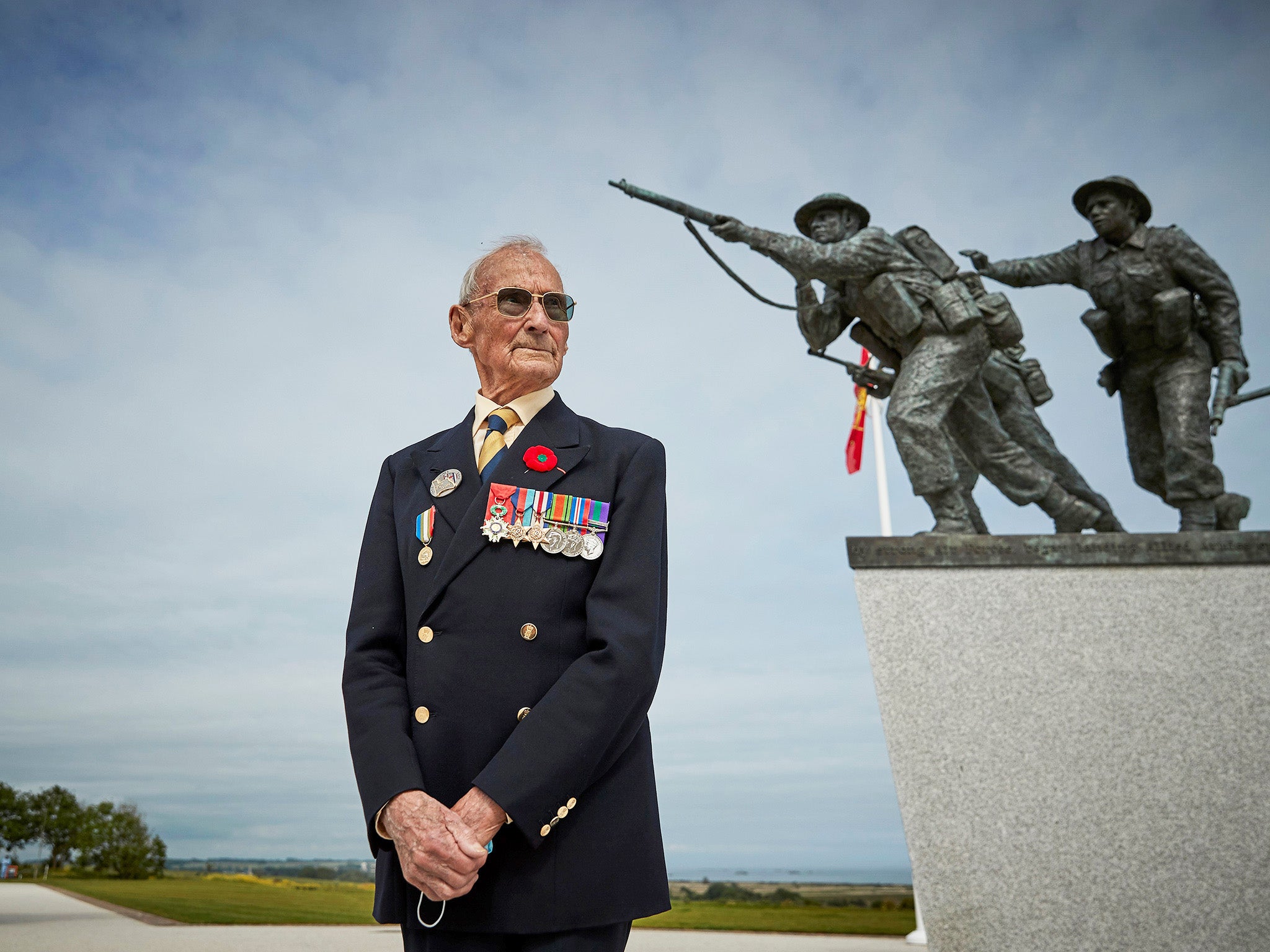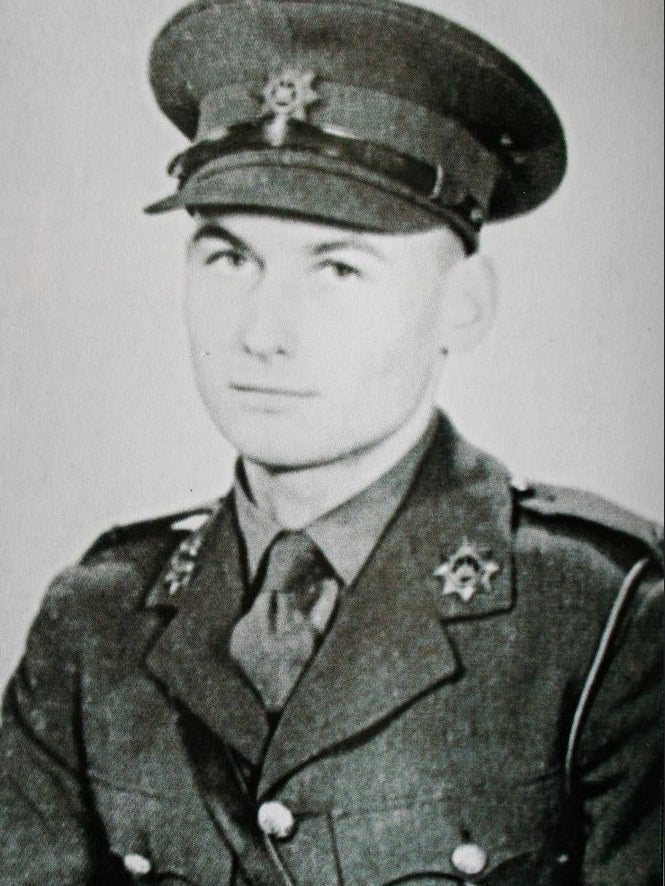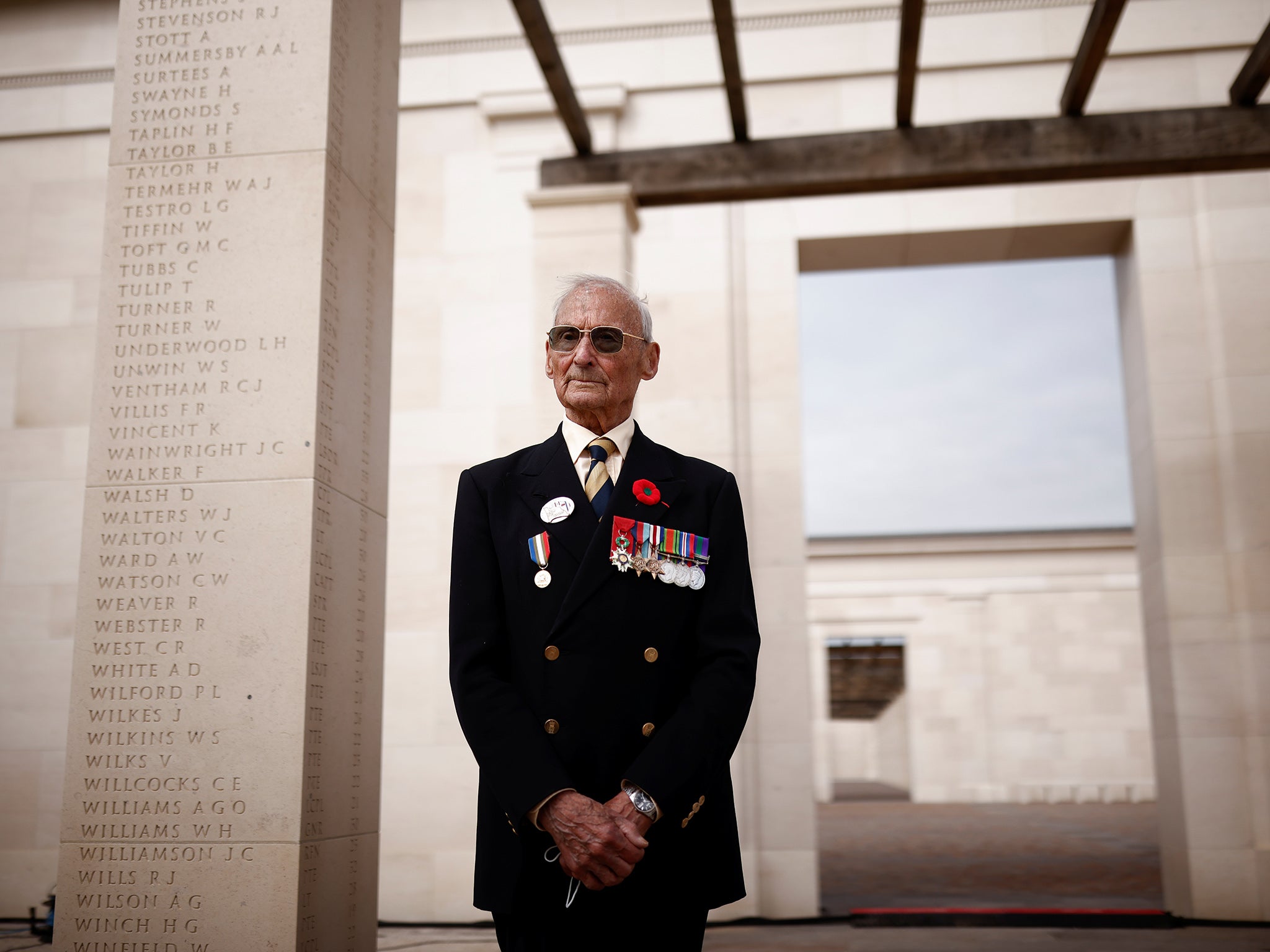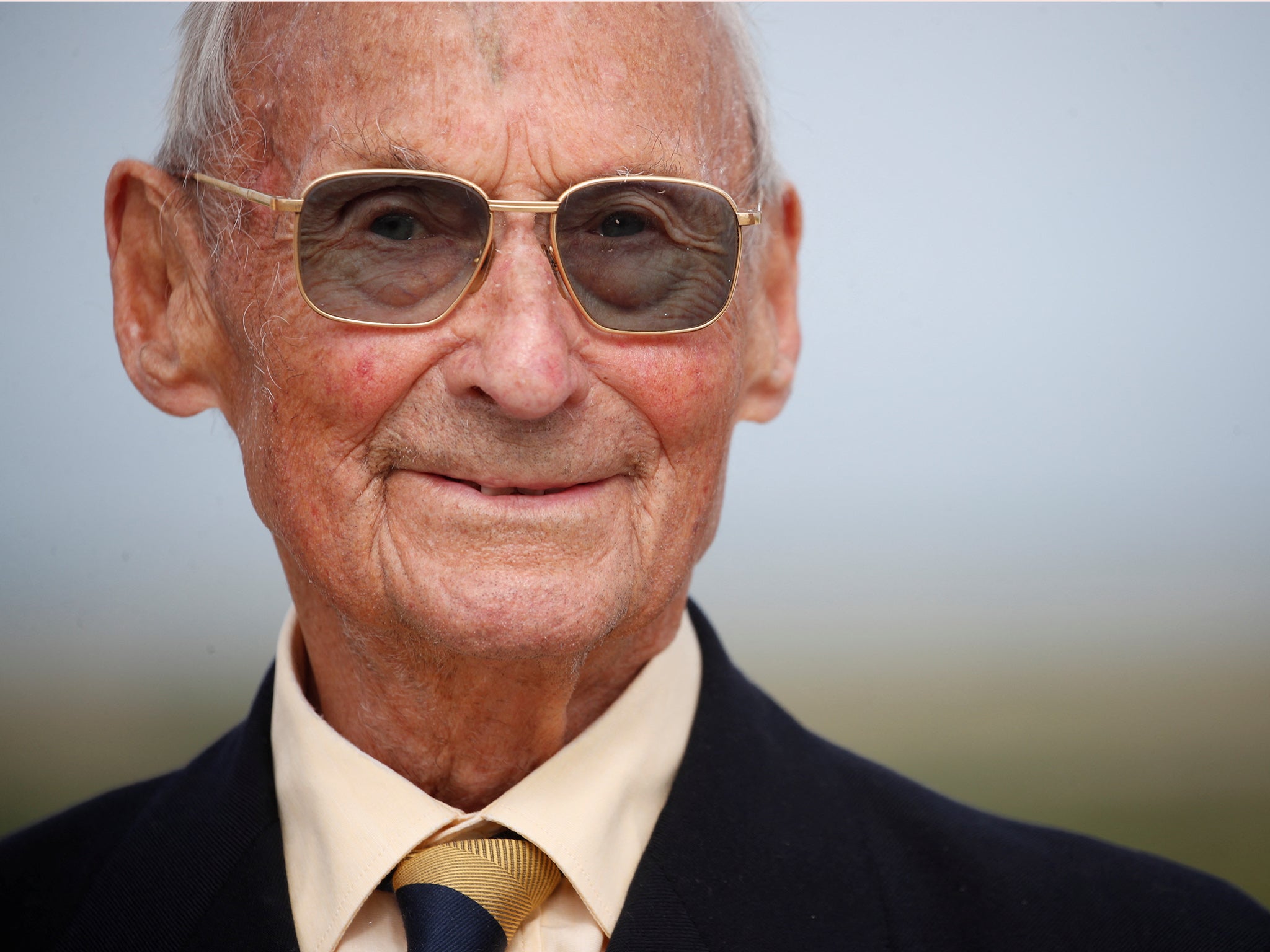David Mylchreest: Normandy veteran and one of the first Allied soldiers to cross the Seine in 1944
At just 20 years old, Mylchreest helped liberate the key town of Vernon and took part in some of the fiercest battles of the Normandy campaign, writes Phil Davison

Your support helps us to tell the story
From reproductive rights to climate change to Big Tech, The Independent is on the ground when the story is developing. Whether it's investigating the financials of Elon Musk's pro-Trump PAC or producing our latest documentary, 'The A Word', which shines a light on the American women fighting for reproductive rights, we know how important it is to parse out the facts from the messaging.
At such a critical moment in US history, we need reporters on the ground. Your donation allows us to keep sending journalists to speak to both sides of the story.
The Independent is trusted by Americans across the entire political spectrum. And unlike many other quality news outlets, we choose not to lock Americans out of our reporting and analysis with paywalls. We believe quality journalism should be available to everyone, paid for by those who can afford it.
Your support makes all the difference.Having landed in Normandy on 12 June 1944 (D-Day plus six, in military parlance), 20-year-old 2nd lieutenant David Mylchreest fought through northern France, Belgium and Holland with the British army’s 43rd Wessex Infantry Division and liberated the key French town of Vernon, which straddles the river Seine. He believed he and his crew were the first Allied soldiers to cross the river in the initial drive towards Berlin.
Attached to the 4th Battalion Somerset Light Infantry, he took part in some of the fiercest fighting of the Normandy campaign around the towns of Argentan, Caen and Falaise, as well as the weeks-long battle for the strategically-vital Hill 112 and Mont Pincon, both near Caen. His war ended at Elst, Holland, in September 1944 when he was badly wounded by an enemy shell during the bloody Battle of Arnhem, made famous by the book and film A Bridge Too Far.
After months of intensive medical care in England and rehab at Richmond Park, Surrey, and by then promoted to captain, he insisted on going back to the front lines and was on board a Motor Torpedo Boat (MTB) in Dover harbour in April 1945, ready to return to the front, when the news came through that the Nazis had surrendered. Like all ships in the harbour, the war-bound MTB turned into a floating party boat, although many years later Mylchreest told the French media: “I was quite furious at not being with my men.”
Even though he had seen it only during the mud and gore of war, Mylchreest had fallen in love with the Normandy countryside and, in the 1970s, went back to spend the rest of his life there, settling in the small commune of Neaufles-Auvergny in northern France. Unlike some of his comrades, his return was not for the love of any French demoiselle, but for his love of horses.
A horseman and trail hunter since his childhood on his native Isle of Man and in Devon, his first post-war job in England had been as a groom at thoroughbred breeding and stud farms, as well as grooming some of the Queen’s racehorses for leading trainers including Cecil Boyd-Rochfort at Newmarket; in the 1970s, he returned to settle in Normandy to work on France’s oldest thoroughbred breeding and stud farm, the Haras du Pin, where he rose to become director until his retirement. Still one of the world’s leading breeding and stud farms for racehorses, the Haras du Pin was founded by king Louis XIV before 1715 and developed by his successor Louis XV. It was occupied by the Germans in 1940-41.
Mylchreest died in hospital in Lisieux, Normandy on 8 March 2023, aged 99, the British Normandy Memorial Trust announced from its headquarters at Ver-sur-Mer on the Normandy coast.

Having learnt French fluently, but retaining an unmistakeable and quite posh English accent, he became a well-known figure in Normandy, notably for his work to maintain the memory of his fallen comrades, including a British Normandy Memorial Monument at Ver, on what the allies at the time called Gold Beach, and close to where he had first landed at Arromanches-les-Bains in June 1944 as a 20-year-old 2nd Lieutenant.
The French named Mylchreest a Knight of the Legion of Honour in May 2015 and on 6 June 2021, the 77th anniversary of D-Day, he represented the UK at the inauguration of the monument, a dramatic bronze sculpture by David Williams-Ellis showing three British soldiers storming across Gold Beach. At the same time, other Normandy veterans unable to travel attended a parallel memorial at the National Memorial Arboretum in Alrewas, Staffordshire.
Captain Mylchreest also represented the Queen in Normandy on the 70th anniversary of the Normandy landings in 2015 and had met her at other memorial services over the years, when, he said, they shared their love of thoroughbreds and horse racing.
Michael David Mylchreest was born on the Isle of Man on 3 February 1924, to a protestant pastor who had served as a British army chaplain in Belgium during the First World War, where his job was to bury dead British soldiers and send letters to their families informing them of their loss.
Young Mylchreest’s uncle David had been killed in 1916, aged 18, during the Battle of the Somme and hence his parents gave him the middle name David, one which he preferred.

When his father moved to England to become a vicar in Buckfastleigh, near Exeter, David boarded at a public school in the latter city. When he was 17, one of his best friends, Nigel, enrolled at the Royal Naval College in Dartmouth, inspiring David to think of a military career. The Luftwaffe bombings of Exeter in 1940 made up his mind. (David learned later that his friend Nigel was one of more than 1,400 men aboard HMS Hood who died after the Germans sank it during the Battle of the Denmark Strait in May 1941.)
When David was 17, he skipped school and went to the local army recruitment bureau, convinced a Sergeant-Major he was 18 and officer material, and signed up. When he got back to school, he told his headmaster “I’m in the army now.”
“We’ll see about that,” his master said, “You lied about your age, I’m calling your father.” He did but David’s father replied: “Tell my son congratulations” and hung up the phone. The master gave David one hour to get out of the school, which he gladly did. “When I arrived at Colchester for my training, I was still wearing my school blazer and we slept on straw in stables. My first day in the army,” he told French author, journalist and war historian Clement Horvath in a 2021 interview.
Mylchreest said he had always refused to give interviews to the British media. Assigned to the 43rd Wessex Division, his first job was at Eastbourne, guarding the coast against a potential German invasion. “But my ambition was, to [get to] Berlin,” he said.

In the podcast, he spoke about his claustrophobia, which he felt when he was sent down below on a Landing Craft Infantry between Newhaven and Normandy on D-Day plus six. Battling through Normandy, despite German shells and machine gun fire, he preferred to sleep outside his trench. And in later life, he hated getting into lifts in buildings.
As his division progressed through Normandy, he found himself in charge of 200 German prisoners. “The British soldiers were good to them,” he said. “The ordinary German soldier was like us, but the average SS [Schutzstaffel] was despicable.”
In the same interview, Horvath asked him: were you ever scared? “Funnily enough, I never felt scared [but] I was always worried. How can I avoid killing somebody? I never expected to survive the war. I only hoped I would be killed, not maimed for life.”
Talking of the assault on Mont Pincon, the highest peak in the Calvados region of Normandy and occupied by the Germans, he described how he and his men took the hill in the middle of the night because, during the day, “every time you moved, you got fired at”. But at night, “We took it in Indian file. The Germans didn’t know we were there. [But] it was an extraordinary battle.”
After the battle, in mid-July 1944, “I was the last to leave [Mont Pincon] with my batman. He was about 18 or 19 years old.” After a German mortar or shell exploded between them, “I ran to the left, he ran to the right. When I came to, he had lost both his arms. I didn’t have a scratch on me. But he died in my arms. And that was horrible,” he told Horvath.
A few weeks later, on 25 August 1944, his division crossed the Seine at Vernon to establish a first beachhead on the eastern bank of the river. They had planned to cross on “Ducks” (US-built DUKW amphibious vehicles) but the river banks were too steep. So Mylchreest and his men got into inflatable “storm boats” with engines he described as “like lawnmowers”.
“My sergeant was 22. I was telling him to put a Bren gun here, a mortar bomb there,” he told Horvath. “And suddenly his head disappeared. Just disappeared. [There was] a sniper overlooking the Seine. I was probably the target since I was the officer. My sergeant just disappeared without a head. He’s buried in the cemetery at Vernon. I visit his grave every year.
“The other storm boats didn’t start … pfut pfut … but mine started with the first pull… Vrrm, vrrm ... so I always claimed I was the first soldier to cross the Seine.”
After the war, Mylchreest served with the Royal Sussex Regiment in Trieste, “defending Tito against the [Soviets]”, he said, as well as in Malta, Egypt and the Dutch East Indies. Because of his love of horses, he was assigned to the 6th Regiment, Royal Horse Artillery, on security duty in Palestine, and later to the 14th/20th King’s Hussars (Cavalry).
In later life, he refused to renew his British passport. “I’m Manx [from the Isle of Man], I’m not British or English.” Asked by Horvath about Brexit, he replied that he and his British comrades had fought not just for the King, but for Europe and democracy: “Why did they die? Don’t talk to me about Brexit, because that makes me ill ... I’m disgusted … I have no intention to go back to England. England is kaput.”
Subscribe to Independent Premium to bookmark this article
Want to bookmark your favourite articles and stories to read or reference later? Start your Independent Premium subscription today.


Join our commenting forum
Join thought-provoking conversations, follow other Independent readers and see their replies
Comments